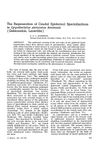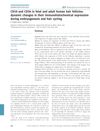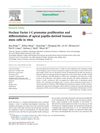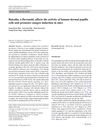 27 citations,
August 2015 in “Experimental Dermatology”
27 citations,
August 2015 in “Experimental Dermatology” Certain electric currents can promote hair growth by activating specific cell pathways.
 27 citations,
August 2014 in “Wiley interdisciplinary reviews. Developmental biology”
27 citations,
August 2014 in “Wiley interdisciplinary reviews. Developmental biology” The skin and thymus develop similarly to protect and support immunity.
 27 citations,
May 2006 in “Biochemical and Biophysical Research Communications”
27 citations,
May 2006 in “Biochemical and Biophysical Research Communications” Wnt-10b is important for starting hair growth and developing hair follicles.
 26 citations,
April 2019 in “Genes”
26 citations,
April 2019 in “Genes” lncRNA XLOC_008679 and gene KRT35 affect cashmere fineness in goats.
 26 citations,
September 2018 in “Journal of Molecular Cell Biology”
26 citations,
September 2018 in “Journal of Molecular Cell Biology” Endoglin is crucial for proper hair growth cycles and stem cell activation in mice.
 26 citations,
November 2016 in “European Journal of Clinical Pharmacology”
26 citations,
November 2016 in “European Journal of Clinical Pharmacology” Valproic acid helps delay hair loss and increases survival time for high-grade glioma patients undergoing radiation therapy.
 26 citations,
October 2016 in “Biomolecules & Therapeutics”
26 citations,
October 2016 in “Biomolecules & Therapeutics” 3-Deoxysappanchalcone helps human hair cells grow and stimulates hair growth in mice by affecting certain cell signaling pathways.
 26 citations,
January 2013 in “BioMed Research International”
26 citations,
January 2013 in “BioMed Research International” Hormonal changes after childbirth and menopause can lead to women's hair loss and facial hair growth, with a need for better treatments.
 26 citations,
August 1971 in “Journal of Morphology”
26 citations,
August 1971 in “Journal of Morphology” Lizards can regrow their tail scales with the same structure, distribution, and gender-specific features as the original ones, and this unique ability is not seen in adult mammals.
 25 citations,
June 2021 in “Developmental Cell”
25 citations,
June 2021 in “Developmental Cell” Dying cells can help with faster healing and new hair growth by releasing a growth-promoting molecule.
 25 citations,
August 2017 in “Animal Biotechnology”
25 citations,
August 2017 in “Animal Biotechnology” Researchers found that certain RNA molecules might play a role in the growth of Cashmere goat hair.
 25 citations,
April 2015 in “Journal of Investigative Dermatology”
25 citations,
April 2015 in “Journal of Investigative Dermatology” GasderminA3 is important for normal hair cycle transitions by controlling Wnt signaling.
 25 citations,
July 2008 in “British Journal of Dermatology”
25 citations,
July 2008 in “British Journal of Dermatology” CD10 and CD34 levels change during hair development and different hair growth stages, which could be important for hair regeneration treatments.
 25 citations,
December 1992 in “Seminars in cell biology”
25 citations,
December 1992 in “Seminars in cell biology” Skin stem cells are maintained by signals from nearby cells and vary in their ability to renew and mature.
 24 citations,
April 2020 in “Cells”
24 citations,
April 2020 in “Cells” DNA methylation and long non-coding RNAs are key in controlling hair growth in Cashmere goats.
 24 citations,
January 2020 in “International Journal of Molecular Sciences”
24 citations,
January 2020 in “International Journal of Molecular Sciences” Some plants with flavonoids may help treat hair loss and promote hair growth.
 24 citations,
November 2018 in “International Journal of Molecular Sciences”
24 citations,
November 2018 in “International Journal of Molecular Sciences” Ethosomes improve drug delivery through the skin but may have side effects like irritation.
 24 citations,
February 2015 in “Experimental Cell Research”
24 citations,
February 2015 in “Experimental Cell Research” NFIC helps human dental stem cells grow and become tooth-like cells.
 23 citations,
January 2021 in “Scientific Reports”
23 citations,
January 2021 in “Scientific Reports” Adding human blood vessel cells to hair follicle germs may improve hair growth and quality.
 23 citations,
December 2020 in “Frontiers in Cell and Developmental Biology”
23 citations,
December 2020 in “Frontiers in Cell and Developmental Biology” Gene network oscillations inside hair stem cells are key for hair growth regulation and could help treat hair loss.
 23 citations,
May 2020 in “Cell Death and Disease”
23 citations,
May 2020 in “Cell Death and Disease” Blocking the FGF5 gene in sheep leads to more fine wool and active hair follicles due to changes in certain cell signaling pathways.
 23 citations,
September 2018 in “Journal of Investigative Dermatology”
23 citations,
September 2018 in “Journal of Investigative Dermatology” A hydrogel made from pig fat helps wounds heal faster by regenerating skin fat cells.
 23 citations,
December 2013 in “Regenerative Medicine”
23 citations,
December 2013 in “Regenerative Medicine” Hair follicle culture helps develop new treatments for hair loss.
 22 citations,
May 2021 in “Nature Communications”
22 citations,
May 2021 in “Nature Communications” Tissue stiffness affects hair follicle regeneration, and Twist1 is a key regulator.
 22 citations,
October 2020 in “Frontiers in Cell and Developmental Biology”
22 citations,
October 2020 in “Frontiers in Cell and Developmental Biology” Fisetin, a type of polyphenol, may help hair grow by increasing certain protein activities in cells.
 22 citations,
March 2020 in “Journal of The American Academy of Dermatology”
22 citations,
March 2020 in “Journal of The American Academy of Dermatology” DSC cell injections significantly improved hair density and diameter, showing potential as a hair loss treatment.
 22 citations,
October 2019 in “International Journal of Nanomedicine”
22 citations,
October 2019 in “International Journal of Nanomedicine” The nanoparticles improved hair growth and enlarged hair bulbs.
 22 citations,
July 2019 in “PLOS ONE”
22 citations,
July 2019 in “PLOS ONE” Skin lymphatic vessels are essential for hair growth.
 22 citations,
August 2017 in “Stem cells and cloning”
22 citations,
August 2017 in “Stem cells and cloning” Stem cell technologies and regenerative medicine, including platelet-rich plasma, show promise for hair restoration in treating hair loss, but more research is needed.
 22 citations,
December 2014 in “Naunyn-Schmiedeberg's Archives of Pharmacology”
22 citations,
December 2014 in “Naunyn-Schmiedeberg's Archives of Pharmacology” Baicalin helps hair grow by boosting certain cell activities and speeding up hair cycle in mice.






























